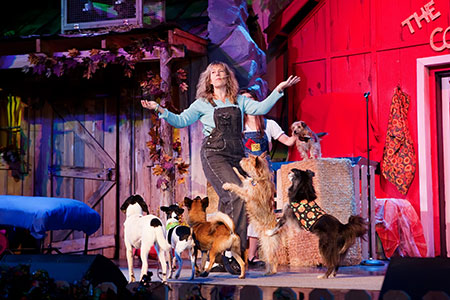Command Performance: Do Words Have Consequences?

I think “yes” would be the accurate answer to this question. Words like “command” and “obedience” reek of control. They are included in the “hammer” style tools of dog training. I much prefer the use of “cue” and “manners”. Like the saying goes, “When you have a hammer, everything looks like a nail.” While this statement is typically applied to actual training tools, this equally applies to the words used in training as well.
Many people assume that words, once spoken, disappear. While that can be true but what can also happen is this; quite often, the words that are used can convey a specific feeling to the person who spoke the words. Words such as command and obedience are forceful. They imply those who they are directed to are inferior and in need of domination. This could not be further from the truth in relation to the dogs in our lives.

Photo of Dawn Goehring of Comedy Barn Canines. www.comedycanines.com. Photo Courtesy of Christine Romano, Rich Blessings Photography
While our dogs certainly require structure and boundaries, they don’t need such words to provide said structure. What they need is kindness, empathy, understanding, and clear communication. They are not looking to take over our world. We have the opposable thumbs, after all.
“Breaking” is another word that is better off dispensed with in regards to housetraining. While the word is appropriately descriptive of the goal that is in mind – as in “breaking the habit” – it does speak to the notion that force can somehow resolve the problem.
According to Raymond Coppinger, dogs chose to join us; domesticating themselves by stationing themselves near human camps. The ensuing partnership was mutual. We provide for their needs. They know this. There is no need to lord it over them with force. They revere us already. They respect us when we work with them rather than on them.
Dogs are the most forgiving creatures I know of. We treat them badly and still they adore us. Using kind words goes a long way towards promoting partnership and trust far more than words that convey the need to wield control with an iron fist. Every step taken towards dismissing such a partnership makes an additional step easier. It becomes a slippery slope.
Forceful words can cause even bigger problems in the multiple dog household. As with a multiple human household, personalities will differ among the crew. A dog that is pushier than another dog can feel emboldened by harsh words spoken at such from the humans in the household. Harshness can create bullies out of humans as well as canines. It is up to the humans to set good examples to be followed. Think of it in terms of children who are emotionally abused by their parents. While they may grow up stronger because of what they endured, there is an equal if not greater chance that they will learn how to be angry more easily than how to be kind.
Compassion and respect should not be reserved solely for one’s fellow humans. All sentient beings are deserving of this. Choosing words that you would use with humans whom you love, with the canines in your lives, will go far towards building the trust that creates a wonderful bond. Words DO matter. Choose them with care.


Debby, I learned to employ a similar philosophy when I was an aerobics instructor and personal fitness trainer. Rather than beating down my class participants and training clients with phrases such as “don’t arch your back” or “that’s not the right way”, I learned to encourage. Statements such as “try to keep your back straight” or “give this different position a try” worked wonders at getting my people to use correct exercise form and avoid harmful movements. If it works with people, it stands to reason it would work with canines, right?